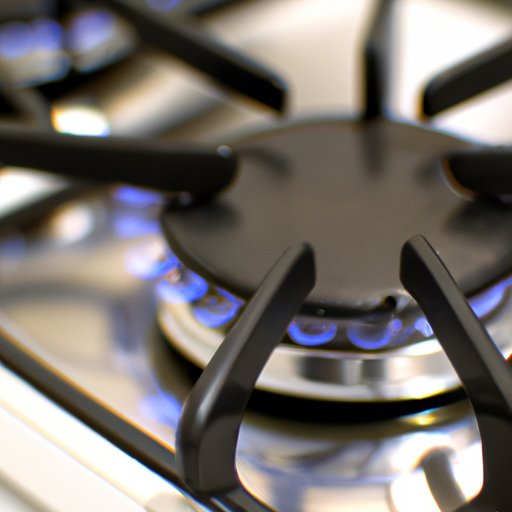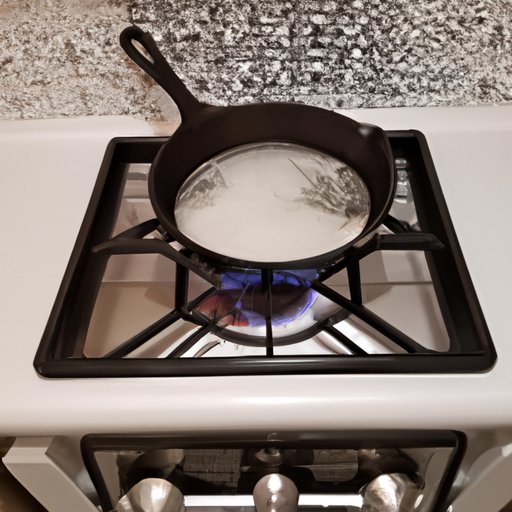
Introduction
Cooking with cast iron is a tradition that has been passed down through generations and for good reason – it’s versatile, durable, and creates delicious meals. However, with the advent of glass top stoves, many have been left wondering if they can use cast iron on their stovetop. This article aims to explore the feasibility, pros and cons, safety measures, misconceptions, and expert tips for using cast iron on a glass top stove.
Exploring the Feasibility: Using Cast Iron on Glass Top Stove
The first question that comes to mind when it comes to using cast iron on a glass top stove is whether it’s feasible. The answer to this is yes, but there are some things to consider. Cast iron cookware can be used on glass top stoves, but not all cast iron cookware is suitable.
One of the reasons people often find themselves in this dilemma is that glass top stoves require a flat and smooth surface to prevent scratches or shattering. Cast iron cookware, on the other hand, is typically rough and bumpy.
To determine whether a cast iron cookware is suitable for glass top stove, check the manufacturer’s directions for use. Some cast iron cookware is designed to be compatible with glass top stoves; others are not.
The Pros and Cons: Using Cast Iron Cookware on Glass Top Stove
Now that we’ve established that it is feasible to use cast iron on a glass top stove, let’s explore the pros and cons of cooking with cast iron on this type of stovetop.
One of the benefits of using cast iron cookware on a glass top stove is that it distributes heat evenly. This means that your food will cook evenly without hot spots. Cast iron also retains heat well, making it ideal for searing meat or frying. Cast iron cookware is also durable and can last a lifetime.
However, there are downsides to using cast iron cookware on a glass top stove. One of the main disadvantages is the weight of the cookware. Cast iron cookware is heavy, and if it’s not lifted properly, it can scratch the surface of the glass top stove or even cause it to crack.
Finding the Right Balance: How to Safely Use Cast Iron on Glass Top Stove
The key to safely using cast iron cookware on a glass top stove is to find the right balance. This means taking the necessary safety measures and using the right type of cast iron cookware.
To prevent scratches or cracks, always lift and move cast iron cookware carefully. Avoid sliding it across the surface of the glass top stove. Also, make sure that the bottom of the cast iron cookware is flat and smooth.
Another safety measure to take is to place a paper towel or cloth between the cast iron cookware and the glass top stove. This will help prevent scratches and protect the surface of the stove.
If you’re using a large or heavy cast iron cookware, use two burners to distribute the weight evenly. This will reduce the risk of damage to the glass top stove.
Misconceptions and Facts: A Comprehensive Guide to Using Cast Iron on Glass Top Stove
There are some misconceptions about using cast iron cookware on a glass top stove that need to be addressed. One of the most common myths is that using cast iron on a glass top stove will damage the stove. This is not entirely true.
While it’s true that if cast iron cookware is not used properly, it can scratch or crack the surface of the glass top stove, this can be easily prevented by taking the necessary safety measures. You can use cast iron cookware on a glass top stove without any damage if you use it properly and take the necessary precautions.
Another misconception is that you should never use cast iron cookware on a high heat setting. This is not entirely true either. Cast iron can handle high heat, but it’s important to preheat it slowly to prevent thermal shock.
Expert Tips for Cooking with Cast Iron on Glass Top Stove
Now that we’ve covered the basics of using cast iron cookware on a glass top stove, let’s explore some expert tips to help you get the most out of your cookware.
Firstly, it’s important to understand that cast iron cookware requires seasoning. This is done by coating the cookware with oil and baking it in the oven. Seasoning helps create a natural non-stick surface and protects the cookware from rusting.
Secondly, to get the best results, preheat your cast iron cookware before adding any food. This will help ensure even and consistent cooking.
Lastly, when cooking with cast iron on a glass top stove, use a lid or splatter screen to prevent food from spilling onto the glass surface. This will help prevent scratches and messes.

Mastering the Art: Cooking Perfectly with Cast Iron on Your Glass Top Stove
Now that you know how to safely use cast iron cookware on a glass top stove and the expert tips to get the best results, why not try out some recipes?
Cast iron cookware is perfect for cooking a range of dishes, from stews to steaks to pancakes. To get the right temperature setting, use medium to low heat.
Avoid making the common mistake of constantly lifting the pan to check on the food. This can scratch the glass surface. Instead, use the lid or splatter screen to check on the food.
Conclusion
In conclusion, using cast iron on a glass top stove is possible with the right type of cookware and safety measures. While it’s true that there are some downsides to using cast iron on a glass top stove, the benefits outweigh the negatives.
Remember to take the necessary safety measures and lift the cast iron cookware carefully. With the proper care and attention, you’ll be able to enjoy the benefits of cooking with cast iron on your glass top stove for years to come.




